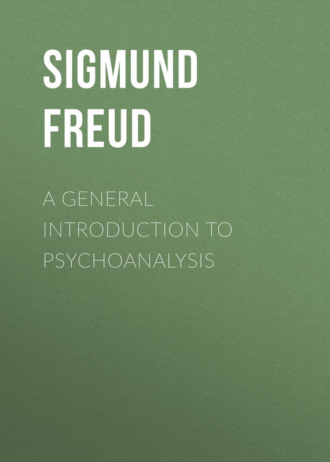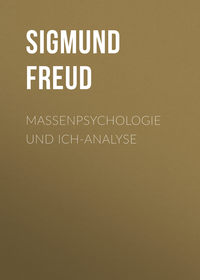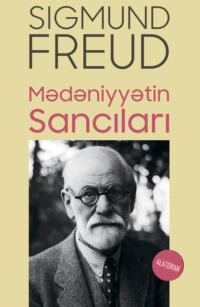 полная версия
полная версияA General Introduction to Psychoanalysis
The same information may be made use of in another of the puzzles that have presented themselves to us. You will recall how astonished people were when we came to the conclusion that the stimuli which gave rise to dreams were extremely bad and licentious sexual desires which have made dream-censorship and dream-distortion necessary. After we have interpreted such a dream for the dreamer and he, in the most favorable circumstances does not attack the interpretation itself, he almost always asks the question whence such a wish comes, since it seems foreign to him and he feels conscious of just the opposite sensations. We need not hesitate to point out this origin. These evil wish-impulses have their origin in the past, often in a past which is not too far away. It can be shown that at one time they were known and conscious, even if they no longer are so. The woman, whose dream is interpreted to mean that she would like to see her seventeen-year old daughter dead, discovers under our guidance that she in fact at one time entertained this wish. The child is the fruit of an unhappy marriage, which early ended in a separation. Once, while the child was still in the womb, and after a tense scene with her husband, she beat her body with her fists in a fit of anger, in order to kill the child. How many mothers who to-day love their children tenderly, perhaps too tenderly, received them unwillingly, and at the time wished that the life within them would not develop further; indeed, translated this wish into various actions, happily harmless. The later death-wish against some loved one, which seems so strange, also has its origin in early phases of the relationship to that person.
The father, the interpretation of whose dream shows that he wishes for the death of his eldest and favorite child, must be reminded of the fact that at one time this wish was no stranger to him. While the child was still a suckling, this man, who was unhappy in his choice of a wife, often thought that if the little being that meant nothing to him would die, he would again be free, and would make better use of his freedom. A like origin may be found for a large number of similar hate impulses; they are recollections of something that belonged to the past, were once conscious and played their parts in the psychic life. You will wish to conclude therefrom that such wishes and such dreams cannot occur if such changes in the relationship to a person have not taken place; if such relationship was always of the same character. I am ready to admit this, only wish to warn you that you are to take into consideration not the exact terms of the dream, but the meaning thereof according to its interpretation. It may happen that the manifest dream of the death of some loved person has only made use of some frightful mask, that it really means something entirely different, or that the loved person serves as a concealing substitute for some other.
But the same circumstances will call forth another, more difficult question. You say: "Granted this death wish was present at some time or other, and is substantiated by memory, yet this is no explanation. It is long outlived, to-day it can be present only in the unconscious and as an empty, emotionless memory, but not as a strong impulse. Why should it be recalled by the dream at all!" This question is justified. The attempt to answer it would lead us far afield and necessitate taking up a position in one of the most important points of dream study. But I must remain within the bounds of our discussion and practice restraint. Prepare yourselves for the temporary abstention. Let us be satisfied with the circumstantial proof that this outlived wish can be shown to act as a dream stimulator and let us continue the investigation to see whether or not other evil wishes admit of the same derivation out of the past.
Let us continue with the removal or death-wish which most frequently can be traced back to the unbounded egoism of the dreamer. Such a wish can very often be shown to be the inciting cause of the dream. As often as someone has been in our way in life – and how often must this happen in the complicated relationships of life – the dream is ready to do away with him, be he father, mother, brother, sister, spouse, etc. We have wondered sufficiently over this evil tendency of human nature, and certainly were not predisposed to accept the authenticity of this result of dream interpretation without question. After it has once been suggested to us to seek the origin of such wishes in the past, we disclose immediately the period of the individual past in which such egoism and such wish-impulses, even as directed against those closest to the dreamer, are no longer strangers. It is just in these first years of childhood which later are hidden by amnesia, that this egoism frequently shows itself in most extreme form, and from which regular but clear tendencies thereto, or real remnants thereof, show themselves. For the child loves itself first, and later learns to love others, to sacrifice something of its ego for another. Even those persons whom the child seems to love from the very beginning, it loves at the outset because it has need of them, cannot do without them, in others words, out of egoistical motives. Not until later does the love impulse become independent of egoism. In brief, egoism has taught the child to love.
In this connection it is instructive to compare the child's regard for his brothers and sisters with that which he has for his parents. The little child does not necessarily love his brothers and sisters, often, obviously, he does not love them at all. There is no doubt that in them he hates his rivals and it is known how frequently this attitude continues for many years until maturity, and even beyond, without interruption. Often enough this attitude is superseded by a more tender feeling, or rather let us say glossed over, but the hostile feeling appears regularly to have been the earlier. It is most noticeable in children of from two and one-half to four or five years of age, when a new little brother or sister arrives. The latter is usually received in a far from friendly manner. Expressions such as "I don't want him! Let the stork take him away again," are very usual. Subsequently every opportunity is made use of to disparage the new arrival, and even attempts to do him bodily harm, direct attacks, are not unheard of. If the difference in age is less, the child learns of the existence of the rival with intense psychic activity, and accommodates himself to the new situation. If the difference in age is greater, the new child may awaken certain sympathies as an interesting object, as a sort of living doll, and if the difference is eight years or more, motherly impulses, especially in the case of girls, may come into play. But to be truthful, when we disclose in a dream the wish for the death of a mother or sister we need seldom find it puzzling and may trace its origin easily to early childhood, often enough, also, to the propinquity of later years.
Probably no nurseries are free from mighty conflicts among the inhabitants. The motives are rivalry for the love of the parents, articles owned in common, the room itself. The hostile impulses are called forth by older as well as younger brothers and sisters. I believe it was Bernard Shaw who said: "If there is anyone who hates a young English lady more than does her mother, it is her elder sister." There is something about this saying, however, that arouses our antipathy. We can, at a pinch, understand hatred of brothers and sisters, and rivalry among them, but how may feelings of hatred force their way into the relationship between daughter and mother, parents and children?
This relationship is without doubt the more favorable, even when looked at from the viewpoint of the child. This is in accord with our expectation; we find it much more offensive for love between parents and children to be lacking than for love between brothers and sisters. We have, so to speak, made something holy in the first instance which in the other case we permitted to remain profane. But daily observation can show us how frequently the feelings between parents and their grown children fail to come up to the ideal established by society, how much enmity exists and would find expression did not accumulations of piety and of tender impulse hold them back. The motives for this are everywhere known and disclose a tendency to separate those of the same sex, daughter from mother, father from son. The daughter finds in her mother the authority that hems in her will and that is entrusted with the task of causing her to carry out the abstention from sexual liberty which society demands; in certain cases also she is the rival who objects to being displaced. The same type of thing occurs in a more glaring manner between father and son. To the son the father is the embodiment of every social restriction, borne with such great opposition; the father bars the way to freedom of will, to early sexual satisfaction, and where there is family property held in common, to the enjoyment thereof. Impatient waiting for the death of the father grows to heights approximating tragedy in the case of a successor to the throne. Less strained is the relationship between father and daughter, mother and son. The latter affords the purest examples of an unalterable tenderness, in no way disturbed by egoistical considerations.
Why do I speak of these things, so banal and so well known? Because there is an unmistakable disposition to deny their significance in life, and to set forth the ideal demanded by society as a fulfilled thing much oftener than it really is fulfilled. But it is preferable for psychology to speak the truth, rather than that this task should be left to the cynic. In any event, this denial refers only to actual life. The arts of narrative and dramatic poetry are still free to make use of the motives that result from a disturbance of this ideal.
It is not to be wondered at that in the case of a large number of people the dream discloses the wish for the removal of the parents, especially the parent of the same sex. We may conclude that it is also present during waking hours, and that it becomes conscious even at times when it is able to mask itself behind another motive, as in the case of the dreamer's sympathy for his father's unnecessary sufferings in example 3. It is seldom that the enmity alone controls the relationship; much more often it recedes behind more tender impulses, by which it is suppressed, and must wait until a dream isolates it. That which the dream shows us in enlarged form as a result of such isolation, shrinks together again after it has been properly docketed in its relation to life as a result of our interpretation (H. Sachs). But we also find this dream wish in places where it has no connection with life, and where the adult, in his waking hours, would never recognize it. The reason for this is that the deepest and most uniform motive for becoming unfriendly, especially between persons of the same sex, has already made its influence felt in earliest childhood.
I mean the love rivalry, with the especial emphasis of the sex character. The son, even as a small child, begins to develop an especial tenderness for his mother, whom he considers as his own property, and feels his father to be a rival who puts into question his individual possession; and in the same manner the little daughter sees in her mother a person who is a disturbing element in her tender relationship with her father, and who occupies a position that she could very well fill herself. One learns from these observations to what early years these ideas extend back – ideas which we designate as the Oedipus-complex, because this myth realizes with a very slightly weakened effect the two extreme wishes which grow out of the situation of the son – to kill his father and take his mother to wife. I do not wish to maintain that the Oedipus-complex covers entirely the relation of the child to its parents; this relation can be much more complicated. Furthermore, the Oedipus-complex is more or less well-developed; it may even experience a reversal, but it is a customary and very important factor in the psychic life of the child; and one tends rather to underestimate than to overestimate its influence and the developments which may follow from it. In addition, children frequently react to the Oedipus-idea through stimulation by the parents, who in the placing of their affection are often led by sex-differences, so that the father prefers the daughter, the mother the son; or again, where the marital affection has cooled, and this love is substituted for the outworn love.
One cannot maintain that the world was very grateful to psychoanalytic research for its discovery of the Oedipus-complex. On the contrary, it called forth the strongest resistance on the part of adults; and persons who had neglected to take part in denying this proscribed or tabooed feeling-relationship later made good the omission by taking all value from the complex through false interpretations. According to my unchanged conviction there is nothing to deny and nothing to make more palatable. One should accept the fact, recognized by the Greek myth itself, as inevitable destiny. On the other hand, it is interesting that this Oedipus-complex, cast out of life, was yielded up to poetry and given the freest play. O. Rank has shown in a careful study how this very Oedipus-complex has supplied dramatic literature with a large number of motives in unending variations, derivations and disguises, also in distorted forms such as we recognize to be the work of a censor. We may also ascribe this Oedipus-complex to those dreamers who were so fortunate as to escape in later life these conflicts with their parents, and intimately associated therewith we find what we call the castration complex, the reaction to sexual intimidation or restriction, ascribed to the father, of early infantile sexuality.
By applying our former researches to the study of the psychic life of the child, we may expect to find that the origin of other forbidden dream-wishes, of excessive sexual impulses, may be explained in the same manner. Thus we are moved to study the development of sex-life in the child also, and we discover the following from a number of sources: In the first place, it is a mistake to deny that the child has a sexual life, and to take it for granted that sexuality commences with the ripening of the genitals at the time of puberty. On the contrary – the child has from the very beginning a sexual life rich in content and differing in numerous respects from that which is later considered normal. What we call "perverse" in the life of the adult, differs from the normal in the following respects: first, in disregard for the dividing line of species (the gulf between man and animal); second, being insensible to the conventional feeling of disgust; third, the incest-limitation (being prohibited from seeking sexual satisfaction with near blood-relations); fourth, homosexuality, and fifth, transferring the role of the genitals to other organs and other parts of the body. None of these limitations exist in the beginning, but are gradually built up in the course of development and education. The little child is free from them. He knows no unbridgable chasm between man and animal; the arrogance with which man distinguishes himself from the animal is a later acquisition. In the beginning he is not disgusted at the sight of excrement, but slowly learns to be so disgusted under the pressure of education; he lays no special stress on the difference between the sexes, rather accredits to both the same genital formation; he directs his earliest sexual desires and his curiosity toward those persons closest to him, and who are dear to him for various reasons – his parents, brothers and sisters, nurses; and finally, you may observe in him that which later breaks through again, raised now to a love attraction, viz., that he does not expect pleasure from his sexual organs alone, but that many other parts of the body portray the same sensitiveness, are the media of analogous sensations, and are able to play the role of the genitals. The child may, then, be called "polymorphus perverse," and if he makes but slight use of all these impulses, it is, on the one hand, because of their lesser intensity as compared to later life, and on the other hand, because the bringing up of the child immediately and energetically suppresses all his sexual expressions. This suppression continues in theory, so to say, since the grown-ups are careful to control part of the childish sex-expressions, and to disguise another part by misrepresenting its sexual nature until they can deny the whole business. These are often the same persons who discourse violently against all the sexual faults of the child and then at the writing table defend the sexual purity of the same children. Where children are left to themselves or are under the influence of corruption, they often are capable of really conspicuous performances of perverse sexual activity. To be sure, the grown-ups are right in looking upon these things as "childish performances," as "play," for the child is not to be judged as mature and answerable either before the bar of custom or before the law, but these things do exist, they have their significance as indications of innate characteristics as well as causes and furtherances of later developments, they give us an insight into childhood sex-life and thereby into the sex life of man. When we rediscover in the background of our distorted dreams all these perverse wish-impulses, it means only that the dream has in this field traveled back to the infantile condition.
Especially noteworthy among these forbidden wishes are those of incest, i.e., those directed towards sexual intercourse with parents and brothers and sisters. You know what antipathy society feels toward such intercourse, or at least pretends to feel, and what weight is laid on the prohibitions directed against it. The most monstrous efforts have been made to explain this fear of incest. Some have believed that it is due to evolutionary foresight on the part of nature, which is psychically represented by this prohibition, because inbreeding would deteriorate the race-character; others maintained that because of having lived together since early childhood the sexual desire is diverted from the persons under consideration. In both cases, furthermore, the incest-avoidance would be automatically assured, and it would be difficult to understand the need of strict prohibitions, which rather point to the presence of a strong desire. Psychoanalytic research has incontrovertibly shown that the incestuous love choice is rather the first and most customary choice, and that not until later is there any resistance, the source of which probably is to be found in the individual psychology.
Let us sum up what our plunge into child psychology has given us toward the understanding of the dream. We found not only that the materials of forgotten childhood experiences are accessible to the dream, but we saw also that the psychic life of children, with all its peculiarities, its egoism, its incestuous love-choice, etc., continues, for the purposes of the dream, in the unconscious, and that the dream nightly leads us back to this infantile stage. Thus it becomes more certain that the unconscious in our psychic life is the infantile. The estranging impression that there is so much evil in man, begins to weaken. This frightful evil is simply the original, primitive, infantile side of psychic life, which we may find in action in children, which we overlook partly because of the slightness of its dimensions, partly because it is lightly considered, since we demand no ethical heights of the child. Since the dream regresses to this stage, it seems to have made apparent the evil that lies in us. But it is only a deceptive appearance by which we have allowed ourselves to be frightened. We are not so evil as we might suspect from the interpretation of dreams.
If the evil impulses of the dream are merely infantilism, a return to the beginnings of our ethical development, since the dream simply makes children of us again in thinking and in feeling, we need not be ashamed of these evil dreams if we are reasonable. But being reasonable is only a part of psychic life. Many things are taking place there that are not reasonable, and so it happens that we are ashamed of such dreams, and unreasonably. We turn them over to the dream-censorship, are ashamed and angry if one of these dreams has in some unusual manner succeeded in penetrating into consciousness in an undistorted form, so that we must recognize it – in fact, we are at times just as ashamed of the distorted dream as we would be if we understood it. Just think of the scandalized opinion of the fine old lady about her uninterpreted dream of "services of love." The problem is not yet solved, and it is still possible that upon further study of the evil in the dream we shall come to some other decision and arrive at another valuation of human nature.
As a result of the whole investigation we grasp two facts, which, however, disclose only the beginnings of new riddles, new doubts. First: the regression of dream-work is not only formal, it is also of greater import. It not only translates our thoughts into a primitive form of expression, but it reawakens the peculiarities of our primitive psychic life, the ancient predominance of the ego, the earliest impulses of our sexual life, even our old intellectual property, if we may consider the symbolic relations as such. And second: We must accredit all these infantilisms which once were governing, and solely governing, to the unconscious, about which our ideas now change and are broadened. Unconscious is no longer a name for what is at that time latent, the unconscious is an especial psychic realm with wish-impulses of its own, with its own method of expression and with a psychic mechanism peculiar to itself, all of which ordinarily are not in force. But the latent dream-thoughts, which we have solved by means of the dream-interpretation, are not of this realm. They are much more nearly the same as any we may have thought in our waking hours. Still they are unconscious; how does one solve this contradiction? We begin to see that a distinction must be made. Something that originates in our conscious life, and that shares its characteristics – we call it the day-remnants – combines in the dream-fabrication with something else out of the realm of the unconscious. Between these two parts the dream-work completes itself. The influencing of the day-remnants by the unconscious necessitates regression. This is the deepest insight into the nature of the dream that we are able to attain without having searched through further psychic realms. The time will soon come, however, when we shall clothe the unconscious character of the latent dream-thought with another name, which shall differentiate it from the unconscious out of the realm of the infantile.
We may, to be sure, propound the question: what forces the psychological activity during sleep to such regression? Why do not the sleep disturbing psychic stimuli do the job without it? And if they must, because of the dream censorship, disguise themselves through old forms of expression which are no longer comprehensible, what is the use of giving new life to old, long-outgrown psychic stimuli, wishes and character types, that is, why the material regression in addition to the formal? The only satisfactory answer would be this, that only in this manner can a dream be built up, that dynamically the dream-stimulus can be satisfied only in this way. But for the time being we have no right to give such an answer.
FOURTEENTH LECTURE
THE DREAM
Wish FulfillmentMAY I bring to your attention once more the ground we have already covered? How, when we met with dream distortion in the application of our technique, we decided to leave it alone for the time being, and set out to obtain decisive information about the nature of the dream by way of infantile dreams? How, then, armed with the results of this investigation, we attacked dream distortion directly and, I trust, in some measure overcame it? But we must remind ourselves that the results we found along the one way and along the other do not fit together as well as might be. It is now our task to put these two results together and balance them against one another.
From both sources we have seen that the dream-work consists essentially in the transposition of thoughts into an hallucinatory experience. How that can take place is puzzling enough, but it is a problem of general psychology with which we shall not busy ourselves here. We have learned from the dreams of children that the purpose of the dream-work is the satisfaction of one of the sleep-disturbing psychic stimuli by means of a wish fulfillment. We were unable to make a similar statement concerning distorted dreams, until we knew how to interpret them. But from the very beginning we expected to be able to bring the distorted dreams under the same viewpoint as the infantile. The earliest fulfillment of this expectation led us to believe that as a matter of fact all dreams are the dreams of children and that they all work with infantile materials, through childish psychic stimuli and mechanics. Since we consider that we have conquered dream-distortion, we must continue the investigation to see whether our hypothesis of wish-fulfillment holds good for distorted dreams also.









